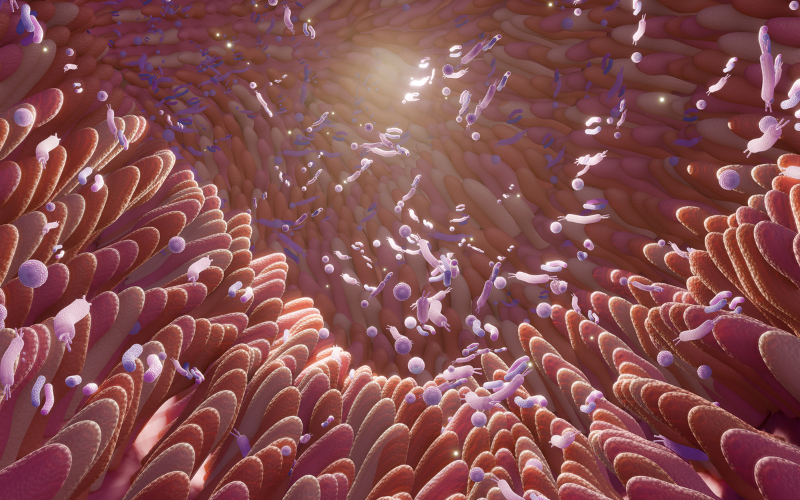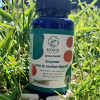We all dream of aging healthily, with the energy and serenity needed to fully enjoy the passing years. There is often an emphasis on sports, balanced nutrition, or even stress management... and that's a good thing. But we sometimes forget an essential player: our gut microbiota. This incredibly rich ecosystem, nestled in our belly, plays a crucial role in how we age.
The microbiota: an ally that evolves over the years
Our gut flora is not static: it constantly transforms, from birth to our old age. However, as we age, studies show that it tends to become impoverished, both in diversity and in the number of bacteria. Additionally, the balance between different families (Firmicutes, Bacteroidetes, etc.) can be disrupted.
- Why is this important? Because when it is rich and varied, our flora produces more beneficial substances, like short-chain fatty acids, which help modulate inflammation and maintain a "protected" intestine. Conversely, if certain beneficial strains become rarer, it can open the door to a low-grade inflammatory state.
Elderly people in institutions, for example, often have a more fragile microbiota than those who remain at home. But age is not the only factor: the intake of numerous medications, diet, the level of physical activity, and the quality of sleep greatly influence the intestinal balance.

When the gut sends warning signals
The link between gut flora and our bones, our immunity, or our metabolism is far from anecdotal. Quite the opposite.
1. Osteoporosis
- With age, the sudden drop in hormones (such as estrogen in women) weakens bone health. However, a healthy microbiota helps properly absorb minerals (calcium, magnesium, etc.) and limits inflammation, which can accelerate the loss of bone density.
- When the balance of the flora is disrupted, the intestine becomes more permeable. Result: pro-inflammatory endotoxins can circulate, hinder bone construction, and encourage its degradation.
2. Colon Cancer
- It is known: colorectal cancer mainly affects people over 50 years old. Research has shown that the bacteria present near tumors (Fusobacterium, certain strains of E. Coli, etc.) are different from those observed in healthy subjects.
- Beyond an isolated bacterium, it is rather the entire microbiota and the compounds it produces that influence the mechanisms of tumor formation.
3. Type 2 Diabetes, Overweight, Hypertension
- These pathologies, although distinct, often root in a context of chronic inflammation. An "overly permeable" intestine can allow molecules (LPS) to pass through that fuel this low-grade inflammation, eventually affecting the metabolic balance.
- The imbalance of the flora is therefore not the sole cause, but it can contribute in the background.
5 Keys to Maintain Your Microbiota and Age with More Serenity
1. Emphasize Fibers
Vegetables, fruits, whole grains, or legumes are a treasure for our good bacteria. They alone provide those famous dietary fibers, some of which are prebiotics, the preferred fuel to nourish and diversify our digestive flora.
- Onions, asparagus, Jerusalem artichokes, leeks: all champions for boosting the production of short-chain fatty acids, strengthening the intestinal barrier, and contributing to an anti-inflammatory environment.
- Moreover, adopting a wide range of plants contributes to a good acid-base balance, which is valuable for the strength of our bones.
2. Rediscover Fermented Foods
The other way to support your bacteria is to make room for them directly by consuming foods rich in living microorganisms, such as lacto-fermented products: raw sauerkraut, fermented vegetables, kefir, miso, kombucha, etc.
- In addition to fibers, you incorporate living microorganisms into your diet, capable of enhancing the diversity of the microbiota and restoring a more favorable environment over time. When this ecosystem is balanced, it acts as a protective barrier, limiting the entry of toxic substances from impaired digestion or bacterial imbalance.
3. Support digestion from top to bottom
With age, the production of gastric acidity may decrease, hindering digestion. The liver, overworked, can also become exhausted. Gradually, these imbalances can promote the onset of digestive disorders such as bloating, heaviness, or irregular transit. And the entire digestive and intestinal balance suffers as a result.
- Focus on foods that support the stomach and the liver: bitter plants (endives, dandelion), broccoli, black radish, aromatic herbs (rosemary, thyme, etc.)…
- Adopting a healthy diet also means knowing how to lighten your meals from time to time. Giving your body a break, whether through simpler meals or occasional fasting, allows our organs to "breathe" and limits the effects of repeated overloads.
4. Pamper your chewing
It may seem trivial, but digestion begins well before reaching the stomach. Chewing allows you to grind food and soak it with salivary enzymes.
- Take the time to eat slowly, away from screens. Savoring each bite greatly facilitates the digestive process and limits the occurrence of bloating.
- If dental issues hinder chewing, it is useful to discuss it with a professional to find suitable solutions.
5. Stay vigilant about medication intake
Many seniors take multiple treatments (anti-inflammatories, antidepressants, proton pump inhibitors, etc.). However, these molecules can disrupt the flora and, in the long term, weaken the intestinal barrier.
- Of course, it's not about banning necessary treatments. But it might be interesting to see, with your doctor or through a holistic approach (nutrition, alternative medicine...), how to possibly reduce comfort or superfluous prescriptions.
- Every effort to preserve the biodiversity of the gut is a step towards a better quality of life.
Aging better also means listening to your gut
Taking care of your microbiota is part of a coherent approach to slow down the effects of biological aging: exercising regularly, managing stress, maintaining restorative sleep... Everything is connected. By combining these efforts, we effectively support our "second brain" and give ourselves every chance to age better.
Yes, the gut is sometimes the forgotten element in health advice, but it certainly deserves to be brought to the forefront. By nourishing this discreet but powerful flora, we provide our body with a solid foundation to navigate the years with more serenity and vitality. Aging is a journey: it's best to have a strong ally by our side, and this precious ally is called the microbiota!

FAQ – Microbiota and Aging
Q: Why is the microbiota so important as we age?
A: Because it is involved in many vital functions: digestion, immunity, inflammation regulation, bone health, and metabolic balance. A depleted or unbalanced microbiota can exacerbate certain effects of biological aging.
Q: How does the microbiota evolve with age?
A: With age, bacterial diversity tends to decrease. Some beneficial strains become less present, while others, potentially pro-inflammatory, may dominate. This imbalance is influenced by diet, physical activity, medications, and lifestyle.
Q: What are the links between microbiota and age-related diseases?
An unbalanced microbiota can promote the onset of conditions such as osteoporosis, type 2 diabetes, hypertension, or even certain cancers (like colorectal cancer), through chronic inflammation or increased intestinal permeability.
Q: What are the signs of a weakened microbiota?
A: Recurrent digestive disorders (bloating, constipation, diarrhea), chronic fatigue, weakened immunity, or increased sensitivity to foods can indicate a microbiota imbalance.
Q: Which foods strengthen a healthy microbiota?
- Prebiotic fibers: fruits, vegetables, whole grains, legumes.
- Fermented foods: kefir, raw sauerkraut, kimchi, miso, lacto-fermented vegetables.
- Bitter and aromatic plants: dandelion, rosemary, black radish, etc.
Q: Are fasting or light meals beneficial for the microbiota?
A: Yes, occasionally. These digestive breaks allow organs to regenerate and can help rebalance the intestinal environment as part of a healthy eating approach.
Q: Do medications impact the intestinal flora?
A: Yes. Some common treatments (PPIs, antibiotics, anti-inflammatories...) can reduce bacterial diversity or weaken the intestinal barrier. It is useful to discuss with a healthcare professional if digestive side effects appear.
Q: What simple actions can preserve your microbiota after 50?
Preserving your microbiota involves focusing on good nutrition as well as balanced living conditions.
Here are some simple actions to adopt daily:
- Vary your plant-based diet.
- Eat slowly, chewing well.
- Move every day, even moderately.
- Get enough sleep.
- To counter the effects of chronic stress, gentle practices like meditation or breathing are true allies of the microbiota.
- Regularly consume live or fermented foods.
References (excerpts)
1. Studies showing the reduction of intestinal permeability thanks to the presence of certain strains (Lactobacillus) in postmenopausal women.
2. Research highlighting the correlation between low-grade inflammation, the presence of blood LPS, and diseases such as type 2 diabetes, obesity, and hypertension.




















